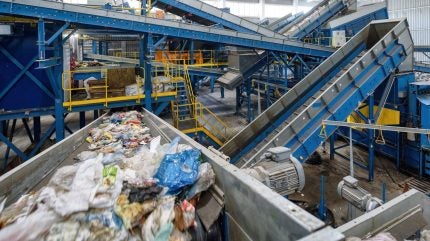
Europe’s plastics recycling industry recorded its steepest decline in 2024, with turnover down 5.5% and installed capacity contracting at a record pace, according to the latest annual report published by Plastics Recyclers Europe (PRE).
Preliminary 2025 data point to a 50% rise in facility closures, putting almost one million tonnes of capacity at risk over three years across Europe.

Discover B2B Marketing That Performs
Combine business intelligence and editorial excellence to reach engaged professionals across 36 leading media platforms.
Installed capacity stood at 13.5 million tonnes in 2024, well below the 6% annual growth needed to meet packaging and waste regulation targets.
For the first time, both input volumes and recyclate output fell, with production slipping from 7.7 million tonnes in 2023 to 7.5 million tonnes in 2024.
Industry turnover declined from €9.1bn ($10.5bn) to €8.6bn year-on-year.
Half of the lost capacity was in the Netherlands and the UK.

US Tariffs are shifting - will you react or anticipate?
Don’t let policy changes catch you off guard. Stay proactive with real-time data and expert analysis.
By GlobalDataThe report cites high raw material and energy costs, weak demand and rising volumes of low‑priced, unregulated imports as the main drivers.
Polyolefin films and PET (polyethylene perephthalate) were the most affected segments, each representing 25% of closures in 2023–2024. HDPE (high-density polyethylene) and PP (polypropylene) each accounted for 15%, with other polymers making up the remaining 20%.
Food‑contact rPET (recycled polyethylene terephthalate) remains under particular strain due to strict EU safety requirements, and the industry argues that imports must meet the same standards to level the playing field.
Germany retained the largest installed capacity at 2.5 million tonnes, followed by Spain at 2 million tonnes and Italy above 1.5 million tonnes.
The UK and France each reported between 1 million and 1.5 million tonnes, with Poland and the Netherlands at between 0.5 and 1 million tonnes.
Spain continued to lead PO (polyolefin) films recycling with more than 0.6 million tonnes.
Germany led PET washing capacity at around 0.7 million tonnes, ahead of Spain at 0.5 million tonnes, with Italy and France at betwen 0.3 and 0.35 million tonnes.
The report warns that closures could more than triple by end‑2025 compared with the 0.14 million tonnes recorded in 2023.
Plastics Recyclers Europe president Ton Emans stated: “Now is the time to stand united for the sector — not only to protect jobs and businesses at risk, but to safeguard Europe’s environmental and technological progress, ensuring a sustainable future for all.
“We call on the EU institutions and national policymakers to act decisively and implement supportive measures to preserve the sector and Europe’s circular economy.”





